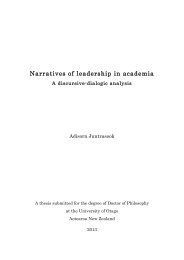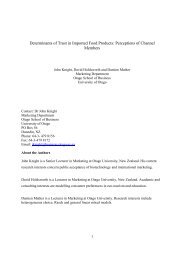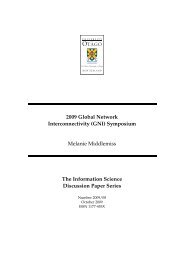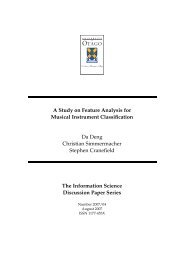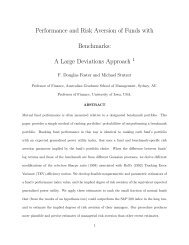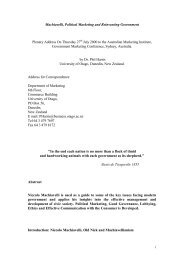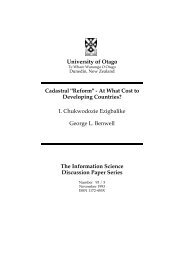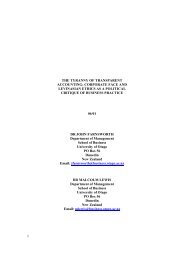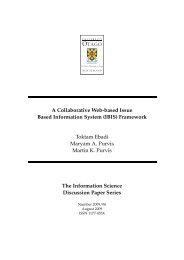Where is R2P grounded in international law? Anne-Marie Judson A ...
Where is R2P grounded in international law? Anne-Marie Judson A ...
Where is R2P grounded in international law? Anne-Marie Judson A ...
You also want an ePaper? Increase the reach of your titles
YUMPU automatically turns print PDFs into web optimized ePapers that Google loves.
CHAPTER 4 - APPLICATION AND STATE DEROGATIONS IN<br />
INTERNATIONAL LAW<br />
As expla<strong>in</strong>ed genocide and war crimes are well def<strong>in</strong>ed <strong>in</strong> <strong>in</strong>ternational <strong>law</strong>. Th<strong>is</strong><br />
clarifies the po<strong>in</strong>t that customary <strong>in</strong>ternational <strong>law</strong> <strong>is</strong> b<strong>in</strong>d<strong>in</strong>g on all states. The<br />
b<strong>in</strong>d<strong>in</strong>g of these grave crimes on all states shows that no derogations from these rules<br />
are acceptable <strong>in</strong> <strong>in</strong>ternational <strong>law</strong>. Application pr<strong>in</strong>ciples <strong>in</strong> regard to genocide and<br />
war crimes have also been shown to be a threat to <strong>in</strong>ternational peace and security.<br />
Th<strong>is</strong> was clarified by Security Council resolutions allow<strong>in</strong>g state <strong>in</strong>tervention <strong>in</strong>to<br />
Rwanda and former Yugoslavia, which means that any situation that ar<strong>is</strong>es under<br />
these terms could be <strong>in</strong>tervened <strong>in</strong> legally with Security Council approval. However<br />
beyond these term<strong>in</strong>ologies <strong>in</strong> <strong>in</strong>ternational <strong>law</strong> it <strong>is</strong> difficult to <strong>in</strong>clude ethnic<br />
cleans<strong>in</strong>g or crimes aga<strong>in</strong>st humanity as a threat to <strong>in</strong>ternational peace and security<br />
without <strong>in</strong>clud<strong>in</strong>g them with<strong>in</strong> the prov<strong>is</strong>ions of war crimes and genocide. Th<strong>is</strong> does<br />
not mean that <strong>in</strong>dividual states do not have a responsibility to prevent these crimes<br />
from tak<strong>in</strong>g place. On the contrary, any state that <strong>is</strong> a party to <strong>in</strong>dividual contracts or<br />
treaties on ethnic cleans<strong>in</strong>g and crimes aga<strong>in</strong>st humanity <strong>is</strong> bound by its duties <strong>in</strong><br />
<strong>in</strong>ternational <strong>law</strong> to prevent them from tak<strong>in</strong>g place.<br />
Th<strong>is</strong> Chapter researches application and state derogations <strong>in</strong> <strong>in</strong>ternational <strong>law</strong> under<br />
customary <strong>in</strong>ternational human rights <strong>law</strong>. It has already been shown above that each<br />
state <strong>is</strong> bound by its duties <strong>in</strong> <strong>in</strong>ternational <strong>law</strong> to the treaties, statutes and conventions<br />
that it <strong>is</strong> party to. It has also been argued that certa<strong>in</strong> treaties are considered<br />
customary and are b<strong>in</strong>d<strong>in</strong>g on all states. The International Covenant on Civil and<br />
Political Rights (1966) protects certa<strong>in</strong> <strong>in</strong>alienable rights and th<strong>is</strong> <strong>in</strong>cludes the right to<br />
life, however some circumstances <strong>in</strong>clud<strong>in</strong>g the state emergency, allow derogations to<br />
take place over some civil and political rights. Th<strong>is</strong> chapter focuses on these<br />
derogations, and what th<strong>is</strong> means <strong>in</strong> terms of the Responsibility to Protect doctr<strong>in</strong>e<br />
when crimes that are committed that are normally considered illegal are<br />
extraord<strong>in</strong>arily def<strong>in</strong>ed as legal under certa<strong>in</strong> circumstances. Th<strong>is</strong> chapter analyses<br />
th<strong>is</strong> framework.<br />
<br />
97



